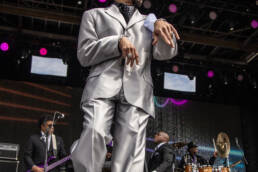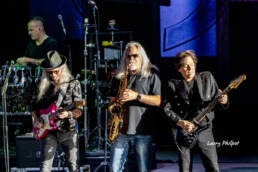The Commodores: The Funk-Soul Brotherhood That Lit Up the Night
Imagine a pack of Alabama college kids, huddled in a Tuskegee dorm, banging out beats on borrowed gear with dreams bigger than their broke pockets. For The Commodores, music wasn’t just fun—it was a bond, a way to fuse funk, soul, and ambition into a sound that conquered the world. From Southern roots to Motown stardom, they rode a wave of groove and grit, leaving a legacy that still gets us dancing. Here’s the story of how a campus crew became soul’s smoothest juggernaut.
The Spark That Started the Funk
The Commodores’ fire ignited in friendship and rhythm. In 1968, Tuskegee Institute freshmen—strangers thrown together—found common ground in music. Lionel Richie, a tennis hopeful turned sax player, met Thomas McClary, a guitarist with a preacher’s soul, and their jam sessions sparked a plan. “We wanted to play, not just dream,” Richie later said. With Motown on the radio—Marvin Gaye, Stevie Wonder—they aimed high, fusing funk’s punch with soul’s heart. Ronald LaPread (bass), William “Wak” King (trumpet), Milan Williams (keys), and Walter “Clyde” Orange (drums) rounded out the crew. Named after a dictionary flip (Commodore beat “Hammerheads”), music became their ticket out of Alabama, a pact to rise together.
The Roots That Ran Deep
Born in Tuskegee, Alabama, the band gelled at a historically Black college steeped in grit. Richie, born June 20, 1949, grew up middle-class, his grandma a pianist. McClary, from Eustis, Florida, brought gospel fire; Orange, a Jacksonville native, pounded drums with swagger. They honed their chops in frat houses, scraping by on $10 gigs. By 1971, they’d hit New York, auditioning for Motown. Berry Gordy passed, but manager Benny Ashburn got them opening for The Jackson 5 in ’72. Signed to Motown in ’73, they moved to L.A., a brotherhood forged in hustle.
Families grew—Richie wed Brenda in ’75, adopted Nicole with her—but the road ruled. Lineup shifts hit later: Richie left in ’82 for solo fame, LaPread in ’86. Today, Orange, King, and J.D. Nicholas carry the torch.
The Career That Sailed to the Stars
The Commodores’ ride was a funk-soul odyssey. Early Motown years—Machine Gun (1974), Caught in the Act (1975)—cranked instrumental heat, “Brick House” a 1977 breakout. Richie’s ballads—“Easy,” “Three Times a Lady” (both ’77-’78)—pushed them popward, multi-platinum with Natural High (1978). The ‘80s shifted gears: Nightshift (1985), a Marvin Gaye tribute, won a Grammy post-Richie. No films, but TV (Soul Train, American Bandstand) and collabs (Richie with Diana Ross) kept them buzzing.
Awards? Grammys, American Music Awards, and a 2014 Alabama Music Hall of Fame nod. In 2025, they’re touring—Orange’s growl, King’s brass—a funky flame still burning.
- Bands: The Commodores (plus Richie’s solo career)
- Classic Bandmates: Lionel Richie (vocals/sax), Thomas McClary (guitar), Walter “Clyde” Orange (drums/vocals), William “Wak” King (trumpet), Milan Williams (keyboards), Ronald LaPread (bass)
- Awards: Grammy (Best R&B Performance, “Nightshift,” 1985), multiple AMAs, Alabama Music Hall of Fame (2014)
Biggest Songs:
- “Brick House” – Written by Lionel Richie, Walter Orange, and others
- “Easy” – Written by Lionel Richie
- “Three Times a Lady” – Written by Lionel Richie
- “Nightshift” – Written by Walter Orange, Dennis Lambert, and Franne Golde
The Waves They Weathered
Trouble’s trailed them. Richie’s 1982 exit—chasing solo gold with “Endless Love”—split fans; some cried sellout, others cheered. A 1981 jet crash scare (no injuries) spooked the crew, and Milan Williams’ 2006 death (cancer) hit hard. Richie’s 1992 divorce from Brenda, amid infidelity rumors, overlapped band lore—tabloids linked it to Motown tensions (untrue). Funk’s fade in the ‘90s shrank their spotlight, but they’ve dodged major scandal, keeping the groove above the fray.
The Beat Still Bumping
From Tuskegee’s dorms to soul’s pantheon, The Commodores turned a college pact into a global pulse. They’re not just a band—they’re a vibe, a funky family that’s weathered time. In 2025, Orange and King keep it alive, proving why they started: to play loud, love deep, and funk up the world one note at a time.
Looking for photos or info about Lionel Richie? Go HERE








